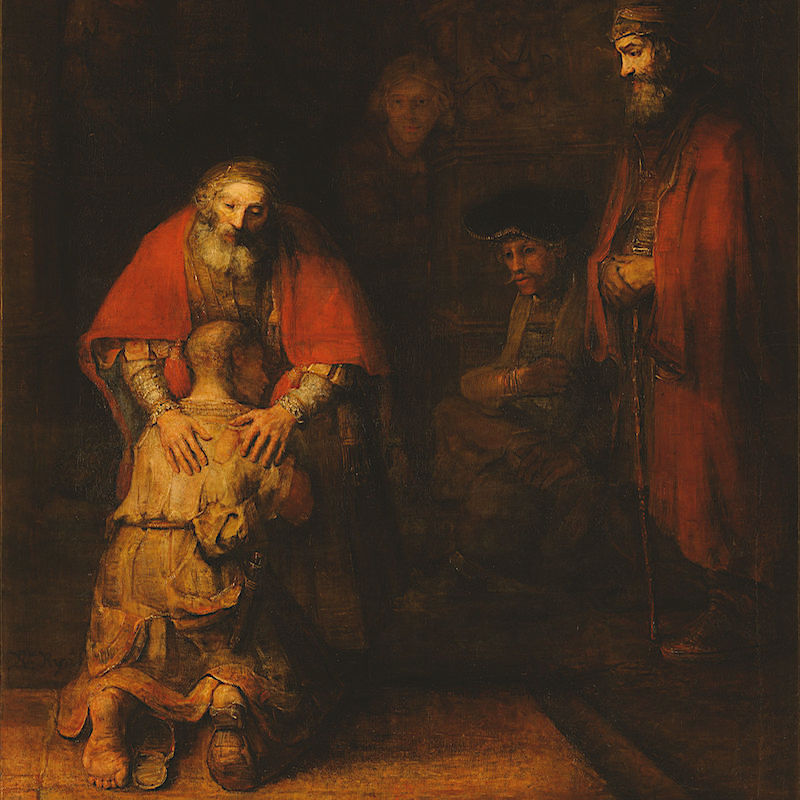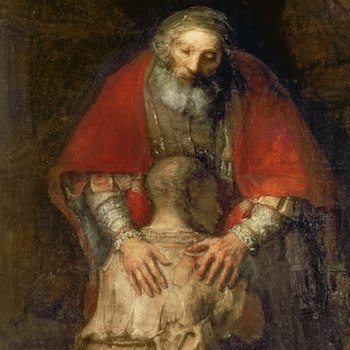A LENTEN ADVENTURE for 2024: Two Sons and A Father - Part 1, The Son That Left Home

A LENTEN ADVENTURE for 2024: Wednesday February 21
All around the world, the famous oil painting portrayed by Rembrandt, “The Return of the Prodigal Son,” is known, appreciated and loved. By many, it is considered to be the greatest and most monumental work ever painted. The painting portrays the moment in which a lost son returns home. It is the story told in one of the most well known of Jesus’ parables. You can read it in Luke 15: 11-32.
Traditionally, the story is known as “The Parable of the Prodigal Son,” even though Jesus Himself never gave it that title. Perhaps the parable should be called “The Parable of the Amazing Father”, because the central figure of the story is not the younger son who returns home, nor the elder son who never left; the main character is the father who loved his two sons so deeply.
Today, we will examine the younger son, the one we know as the “prodigal son”. As I was reading about this character, I realized that my understanding of the meaning “prodigal” was completely inaccurate. After asking several people what they thought about the meaning of the word, I discovered that only one of them knew the real meaning of the word. Contrary to what I thought, “prodigal” does not mean “to be lost and to return home”. “Prodigal” describes someone who spends money excessively and wastefully. What I learned is interesting – but also sad. Even though it is a fictional story, it’s unfortunate to be a person remembered in history only for something negative, especially when in the end there was reconciliation and restoration …
The younger son: we know that he had a father and an older brother; we know nothing about his mother. However, it does not appear that he had a close relationship with his father or his brother.
One day, he told his father to give him the part of the properties belonging to him, in other words his inheritance. When he was given his share, he sold it for money. Shortly after he had the money in his hands, he travelled far away to a distant country. What kind of son would do that?
In the Jewish culture of that day, a request and a course of action of this magnitude were very unusual. While they were alive, parents always had complete control over their properties. They decided when and how they would turn over their inheritance. That the younger son asked for the inheritance was a great insult, and even worse was that he asked for it while his father was very much alive. Essentially, it didn’t matter to the son whether his father lived or died; the only thing that interested him was his inheritance.
What’s more, in the Jewish culture of that day, even if a father decided to divide his properties among his inheritors, neither the father nor his sons could sell the properties while the father was alive. But the younger son did not care about standards of decency, he only cared about money.
When the younger son left home, he left his father and elder brother by themselves to protect the house and properties that remained. Neither the family nor the inherent responsibilities that came with it mattered to the son; he was only interested in his freedom so that he could go far away and live his own life.
But the story goes from bad to worse. It appears that the younger son left not only appropriate behavior by the wayside, but also all his beliefs, because the distant country where he journeyed to was not part of Israel, but a pagan country. Later in the story, we see that in this pagan country there were pig-farms (pigs being animals considered unclean by Jews). In that distant country, the younger son lived a dissolute life and lost his wealth. One day, a great famine came to that place, and because he had wasted all his possessions, he began to have need. The only choice he had to survive was to ask one of the citizens of that country for work feeding the pigs on his farm. There, he wanted to fill his stomach with the pods the pigs were eating, but no one gave him anything. Consider all that happened to the younger son! He was far away from home, in a pagan land, with no money, with no place to live, no food, no family and no friends – alone, abandoned, hungry, lost, almost dead. But here the story changes course, because in that moment the younger son came to his senses.
It was in the midst of the pigs that the son began thinking again about his father’s house. It was in the middle of the mud and stench of his arduous work that he decided to repent, get up and return to his father, to confess his sin against him and heaven, to recognize his unworthiness to be called a son, and to humble himself and accept returning as a simple worker. His stony heart had been turned into a contrite heart made of flesh. When he could go no lower, he remembered his house and his father, and in complete humility and brokenness decided to ask if he could return home.

Dear friend: Where are you? Are you also far away from your heavenly Father? At some point did you lose your sense of home and family and decide to go far away to live your life without Him? Did you waste everything He gave you? Have you squandered your life? Have you gone as low as you can go and are you living with the pigs, or even like the pigs?
Dear friend: Come to your senses! Think about your life! It’s not too late – there is still hope. Recognize that you are lost and dead, repent, confess your sin – and then get up and return to your heavenly Father’s home.
You have already read the rest of the story (if you haven’t, do it now: Luke 15:20-32). You already know what your welcome at home will be like. It won’t be what you deserve. It won’t be what you fear. God the Father will surprise and overwhelm you with His mercy, emotion, and overflowing love for you. He won’t remind you of your miserable past. He will neither accuse you nor condemn you for all your mistakes.
No! When you are still far away, He will see you coming, and moved by mercy, He will run to you, He will embrace you and kiss you. Can you imagine a more incredibly exuberant and generous welcome?
Dear friend: take advantage of this moment – right now there is still time.
(I encourage you to go to YouTube and listen to a song that came out in 1983, written and sung by a very well known singer at the time, Keith Green, who has since passed away. The name of the song is the “The Prodigal Son” – it’s a beautiful rendition of this magnificent story of love and reconciliation. You can listen to it by clicking on the following link: http://www.youtube.com/watch?v=N3TYkAWRdU4.)
(Translated by Crista Hirmas)
+ REFLECTIONS